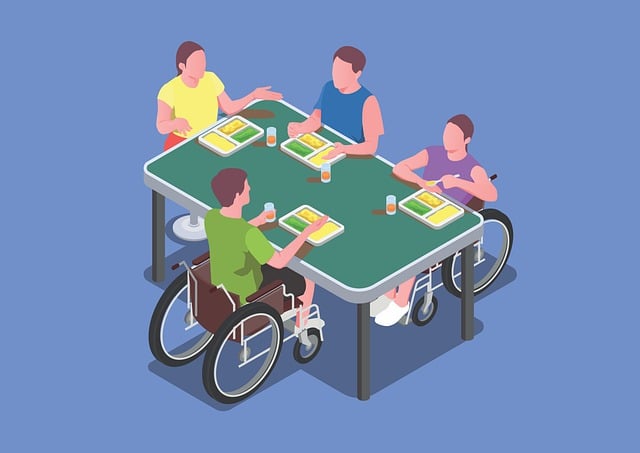Trauma-informed therapy offers a revolutionary approach to holistic wellness, addressing the profound impact of trauma on mental, emotional, and physical health. Integrating cognitive-behavioral therapy (CBT), mindfulness, art for healing, yoga, and meditation, this comprehensive method recognizes that trauma affects both mind and body. Somatic therapy facilitates body connection, fostering safety and grounding, while these integrated practices collectively support emotional healing by addressing the interplay of mind, body, and spirit in integrative wellness therapy.
“Discover the transformative power of trauma-informed therapy, a holistic approach designed to nurture comprehensive healing. This article explores the intricate process of healing from trauma, highlighting key components such as cognitive-behavioral therapy, art therapy, yoga, and meditation. We’ll delve into how these practices, when integrated, promote emotional well-being through a multi-faceted approach, making it accessible for everyone seeking mindfulness and somatic therapy solutions in their journey towards holistic wellness.”
- Understanding Trauma-Informed Therapy: A Holistic Approach to Wellness
- Key Components of Effective Trauma Healing Practices
- Integrating Various Therapies for Comprehensive Emotional Wellbeing
- Benefits and Applications of Trauma-Informed Care in Everyday Life
Understanding Trauma-Informed Therapy: A Holistic Approach to Wellness

Trauma-informed therapy is a revolutionary approach to holistic wellness that recognizes the profound impact traumatic experiences can have on an individual’s mental, emotional, and physical health. Unlike traditional therapy models that often focus solely on cognitive or behavioral aspects, this comprehensive method understands that trauma lingers in the body and mind, manifesting as a range of symptoms from anxiety and depression to chronic pain and dissociation.
By integrating various therapeutic modalities such as cognitive-behavioral therapy (CBT), mindfulness therapy, art therapy for healing, yoga therapy, and meditation for holistic wellness, trauma-informed therapy offers a multifaceted approach to emotional healing. Somatic therapy, for instance, helps clients reconnect with their bodies, fostering a sense of safety and grounding. This holistic perspective recognizes the interconnection between mind, body, and spirit, ultimately promoting deep and lasting recovery.
Key Components of Effective Trauma Healing Practices

In trauma-informed therapy, several key components work together to facilitate comprehensive healing and promote holistic wellness. One fundamental aspect is mindfulness therapy, which helps individuals develop present-moment awareness, a crucial skill for managing traumatic memories and triggers. By focusing on the here and now, clients can learn to navigate intense emotions without being overwhelmed, thereby fostering emotional regulation and resilience.
Additionally, cognitive-behavioral therapy (CBT) plays a significant role in reframing negative thought patterns associated with trauma. CBT equips individuals with coping mechanisms by identifying and challenging distorted beliefs, replacing them with more adaptive ones. Integrative wellness therapy further enhances this process by incorporating various therapeutic modalities like art therapy for healing, yoga therapy, and meditation for holistic wellness. These practices offer alternative ways to express and process emotions, engage in self-care, and cultivate a sense of calm and balance, contributing to the overall emotional healing process.
Integrating Various Therapies for Comprehensive Emotional Wellbeing

In trauma-informed therapy, a comprehensive approach to healing is adopted, recognizing that various therapeutic modalities can work synergistically to support holistic wellness. This often includes integrating different techniques such as cognitive-behavioral therapy (CBT), mindfulness therapy, and somatic therapies like yoga and art therapy for healing. CBT helps individuals identify and change negative thought patterns, while mindfulness practices foster present-moment awareness and emotional regulation. Somatic therapies, on the other hand, focus on the mind-body connection, addressing past traumas through non-verbal means like movement and creative expression.
Integrative wellness therapy also incorporates art therapy, which can be a powerful tool for emotional healing. Engaging in artistic processes allows individuals to explore and convey their feelings, memories, and experiences in safe and meaningful ways. Additionally, meditation for holistic wellness is often encouraged, promoting relaxation, reducing stress, and enhancing overall well-being. These integrated therapeutic practices collectively contribute to comprehensive emotional healing by addressing the mind, body, and spirit as interconnected aspects of human experience.
Benefits and Applications of Trauma-Informed Care in Everyday Life

Trauma-informed care offers a multitude of benefits and applications that can enhance everyday life. By integrating various therapeutic approaches like cognitive-behavioral therapy, mindfulness therapy, and art therapy for healing, individuals can experience comprehensive holistic wellness. These methods support emotional healing therapy, enabling people to process traumatic memories and develop healthier coping mechanisms.
Somatic therapy, including yoga therapy and meditation for holistic wellness, plays a significant role in this process by promoting mind-body connection and reducing stress responses. Integrative wellness therapy, which combines these diverse techniques, provides a nurturing environment where individuals can explore and heal from past traumas while cultivating resilience and enhancing overall well-being.
Trauma-informed therapy offers a comprehensive and holistic approach to wellness, addressing the complex nature of trauma’s impact on the mind and body. By integrating various therapies such as cognitive-behavioral therapy, art therapy, yoga therapy, mindfulness practices, and somatic healing, individuals can experience profound emotional liberation and improved quality of life. This integrated approach recognizes the interconnectedness of our mental, physical, and spiritual well-being, fostering a nurturing environment for true and lasting healing. Embrace these practices to unlock your journey towards holistic wellness and reclaim your sense of balance and peace.
